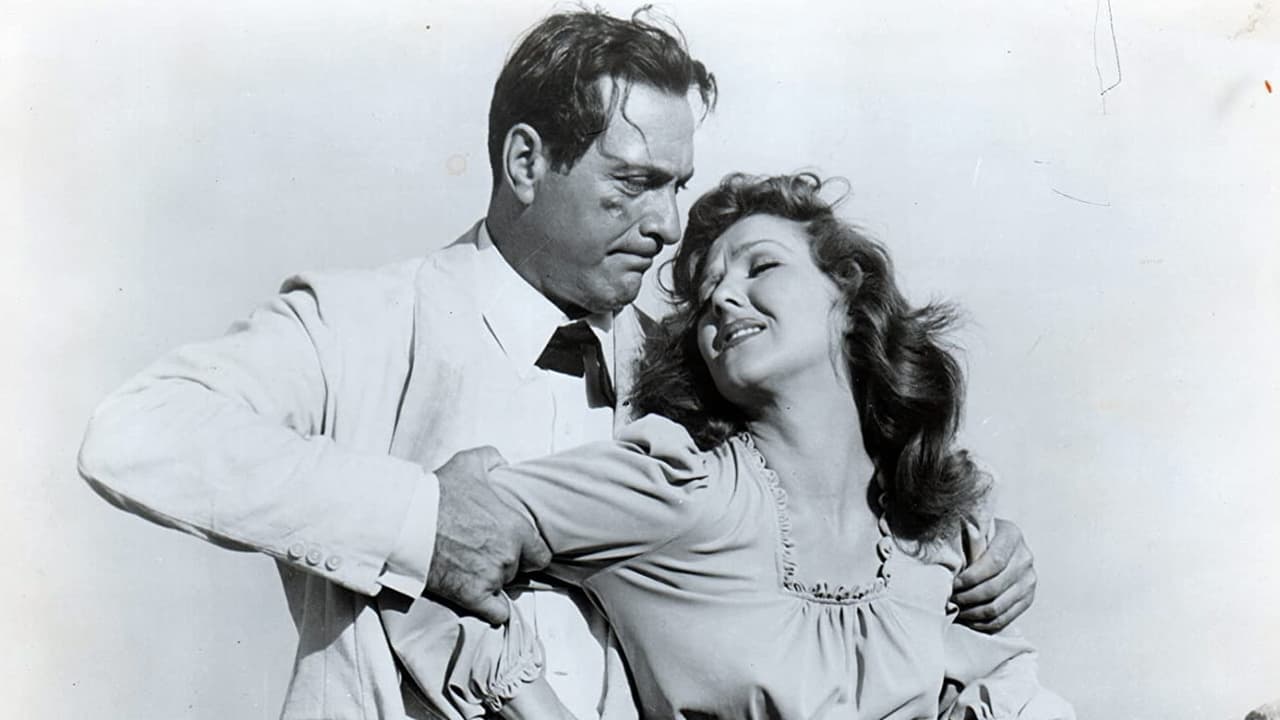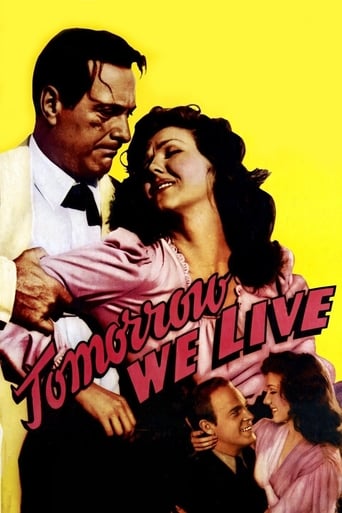

***SPOILERS*** Former screen Latin lover with a tough New York City accent Ricardo Cortez plays big time hood Alexander Casear Martin who's nicknamed The Ghost. Martin got a racket going in the middle of the Arizona Desert storing used tires and selling them for a profit in the black market. This while his country the USA is involved in a life and death struggle with the forces of fascism around the world. Known as the Ghost because he survived two assassination attempts Martin is told by his doctors that he doesn't have long to live so he lives dangerously by throwing his weight around at rival gangsters one being Big Charlie who's trying to muscle into his black market racket.As we soon find out Martin uses Pop Bronson's, Emmett Lynn, diner called the "Busy Bee" as the center of his criminal operations. It's Pop's daughter Julie, Jean Parker, who's just back from collage, which she dropped out of, who smells a rat in her dad's relationship with Martin and want him to discontinue it. There's also Julie's former boyfriend now an officer in the US Army Let. Bob Lord, William Marshall, who wants to rekindle his love affair with her who's now stationed in an army camp not far from Pop's diner. It's doesn't take long for the womanizing Martin to start to work on Julie whom he met at his night club "The Dunes" where she went to have a few drinks and party. All throughout the rest of the movie Marin's obsession with Julie blinds him from what Big Charlie is planning for him. Julie soon finds out why her father Pop is so deeply involved with Martin in that he's been blackmailing him for the last eight years. That in Pop being a wanted fugitive from the law in a jail break he was involved in where three people were killed.***SPOILERS*** The film seems to try to equate Alexander Caesar "the Ghost" Martin with fascists dictators like Hitler and Togo whom the USA at the time, 1942, was at war with. That seems to be the reason that Julie's boyfriend is a member of the US Military slated for the Pacific Theater of War to battle it out with the fascist Japanese Empire as well as doing battle against Martin and his hoods back home. Still as hard as it tries the movie falls flat on its face in trying to do that. Even the reality challenged Martin finds it all ridicules in a backwards sort of way when he's compared to Adolph Hitler by Bob Lord. That in Martin feeling that Hiter is nothing but a two bit hood who at the time controlled almost all of Europe not a successful mob boss like himself who only controls, and is in danger of losing it, a small patch of land in the middle of the Arizona Desert.The best part in the movie is saved for the last when after being worked over by Big Charlie's men Martin ends up in the middle of the desert hitchhiking his way to Pop's diner, with Pop 's daughter Julie giving him a lift, where he ends up completely losing it. Finally realizing that his criminal empire is history Martin suddenly goes nuts or wacko with a fatally wounded Pop Bronson, whom Martin had just gunned down, putting him out of his both madness as well as misery with a bullet to his gut.
... View MoreI see so far I'm in a minority here for some folks are finding all kinds of murky and mysterious meanings in Tomorrow We Live. All I'm looking at is a Grade Z piece of melodramatic claptrap. Poor Ricardo Cortez's career had come to a pretty pass here for a guy who was the last player billed OVER Greta Garbo back in silent days. And a rival in the Latin lover department to Rudolph Valentino besides.Cortez's character 'the Ghost' is a veiled reference to Lucky Luciano who got his nickname by surviving a hit attempt as did Cortez. He's got himself a nice little gambling spot out on the desert in some unnamed western state that I think we can assume is Nevada. He's got the hots for Jean Parker and he's also got a hold on her father Emmett Lynn who runs a nearby truck-stop greasy spoon like café. The kind that Cecil Kellaway had in The Postman Always Rings Twice.Anyway Cortez has Lynn working in a black market tire racket and Parker submitting herself to his Snidely Whiplash advances. She actually throws over her all American soldier boyfriend William Marshall for Cortez. But Marshall tells off Cortez that he's going overseas to fight guys like him.Anyway the film was made too soon because Lucky Luciano due to efforts by the War Department got himself paroled and deported to Cuba for allegedly setting up contacts with the Italian Mafia for OSS operatives in Italy. That came after Tomorrow We Live was inflicted on the movie going public which does give this film a certain amount historical curiosity.But definitely not worth the little over an hour of my life I'll not get back.
... View MoreIt is amazing how some poverty row productions have coherent scripts with quite a few interesting aspects which lifts them above the average fare (always provided you are interested in movies of this epoch). There is quite a lot going on during the short 63 Minutes this movie will take of your time.The heroine - a very wholesome looking Jean Parker is the daughter of the owner of a small café and gas station in the middle of the desert. Her father is involved (he operates an illegal stash of tires) with a gangster who retreated here from the East and opened a night club in the desert. It is a strange mixture of a Corleone-kind of figure and Edward Robinson's Johnny Rocco in Key Largo.The girl has to choose between the gangster and her former boyfriend who has just joined the army. The gangster knows that because of injuries which date from shootouts he will not live much longer and tries to use this as an argument for the hesitant girl to marry him. He is in trouble because some competing local gangsters (all wearing ten gallon hats) want to run him out of the place (this is also slightly reminiscent of Godfather II).The army officer boyfriend has a showdown with the gangster. He enters his snazzy office in the night club, looks around, nods in confirmation and says: This looks like Berchtesgaden, you know, where Hitler chews rugs. After this rather surprising opening he goes on to tell the gangster that he, like Hitler, will soon be a has-been and that there will be no place for guys like him in the country. It's a little like Bogart's speech in Key Largo.Oh yes, and the girl's poor father is forced by the gangster to bury a corpse in the desert. Like I said, quite a lot is going on and everything ties in nicely in the story, which is not too often the case in today's A-productions. Edgar G. Ulmer as always succeeds to create an atmosphere which helps the story along and makes this movie worth your while.
... View MoreAfter an opening sequence featuring stock footage so dark and dupey that its difficult to tell what we're seeing, the film proper begins (and lightens up to acceptable visual quality) and moves into Pop Bronson's (Emmett Lynn) desert diner. We find Pop in mid-conversation with his daughter Julie (Jean Parker, who also starred in Ulmer's BLUEBEARD) who has just dropped out of college. Pop has been sending her money for years to put her through school and he's understandably upset about her sudden, inexplicable dropout. The scene is deliberately disorienting, as it takes a while before we understand the context of their conversation. When Julie accuses her father of black marketeering (this is war time, after all), Pop gives her a vicious slap. The whole scene prepares us for an unsettling experience which the film does not deliver until it's more than half over, settling in to long soap opera conversations filmed in uninteresting master shots. We meet Ricardo Cortez, gangster owner of a desert night club, who has earned the moniker of "The Ghost" for his survival of two attempts on his life. Thirty-five minutes into this barely 63 minute movie, the guns start blazing, the camera begins to move and the editor wakes up. Julie's Army boyfriend shows up to give The Ghost a major dressing-down, comparing him to Hitler and warning him that the honest little people will soon beat his pants off. Instead of the little people, its a rival gangster who beats The Ghost nearly to death and burns down his club, driving the man mad. The film now races to a speedy, suspenseful conclusion. In his career-spanning interview with Peter Bogdanovich Ulmer described this as a horror film influenced by Grand Guignol (which it is not), but its opening scene, final 30 minutes, odd patriotic imagery and good performances from Cortez and Parker make it worth seeing for anyone interested in Ulmer's career of making something out of nothing.
... View More